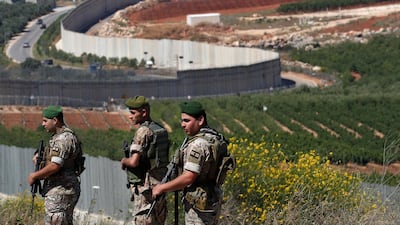French Armed Forces Minister Florence Parly offered to organise a UN-backed conference to support the cash-strapped Lebanese military during a meeting with Lebanon's army chief Gen Joseph Aoun in Paris this week.
It is not clear when the proposed conference will take place and whether it would aim to raise cash or secure in-kind assistance.
"The Minister of Armed Forces mentioned to the army chief that she was available to mobilise partners to increase support towards the Lebanese army in co-operation with the United Nations," a French diplomatic source told The National.
The offer was well received and an army source said "the conference should happen soon".
Lebanese media reported on Thursday that it could take place in Paris in June.
French army chief Gen Francois Lecointre invited Gen Aoun to Paris for a two-day visit. He met Ms Parly on Tuesday and French President Emmanuel Macron on Wednesday.
The Lebanese army said that Gen Aoun and Mr Macron discussed the challenges the military faced.
“Macron stressed the importance of supporting the Lebanese army for the sake of Lebanon’s stability," it said.
Quoting anonymous sources, Reuters reported that Gen Aoun told France that Lebanon's worst economic crisis put the military on the verge of collapse.
Discontent is brewing among Lebanon's security forces over a currency crash that has wiped out the value of their salaries and caused rampant inflation.
The average monthly income of a low-ranking soldier has shrunk from about $800 to less than $100 in less than two years.
In recent months, France, Turkey, Morocco and Oman flew food boxes to the Lebanese army, which stopped serving meat to soldiers last June.
In unusually frank words aimed at the Lebanese political class, Gen Aoun said in March that “soldiers are suffering and they’re hungry”.
But Gen Aoun's warning fell on deaf ears. Lebanon's prime minister-designate Saad Hariri and President Michel Aoun have been squabbling for more than eight months over how to distribute ministerial posts in the future Cabinet.
France has repeatedly threatened to impose sanctions against politicians, but stopped short of naming potential targets.
Unlike politicians, the army is a popular institution among the Lebanese, who consider it to be largely above the country’s sectarian divisions.
But the army is also dependent on foreign support. The US is its biggest donor and pledged last week to give $120 million to the institution this year, boosting its aid by 12 per cent.
US and western donors view the army as a bulwark against non-state armed groups such as Hezbollah, which is backed by Iran.
France and the UN have organised two conferences to help Lebanon since a devastating explosion at Beirut port on August 4, 2020.


